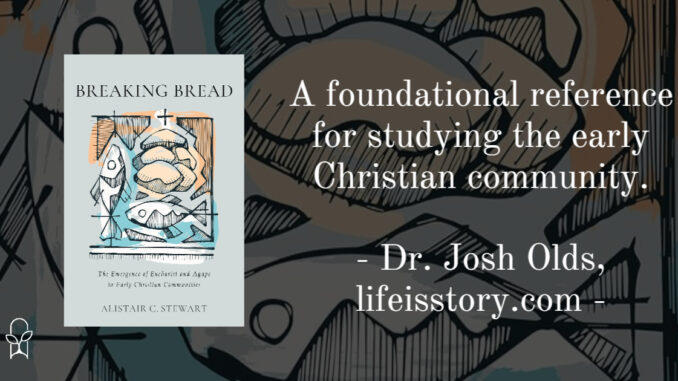
Published by Eerdmans on June 27, 2023
Genres: Academic, Non-Fiction, Theology
Buy on Amazon
Goodreads

What’s the difference between eucharist and agape? And how did each come to be?
The liturgies of early Christians are often obscure and variegated in the historical record. This is especially true of the eucharist, where the basic practice of communal eating is difficult to disentangle from other contemporary meals, whether Greco-Roman or Jewish practices—or the ill-defined agape meal.
In Breaking Bread, Alistair C. Stewart cuts through scholarly confusion about early Christian eating. Stewart pinpoints the split in agape and eucharist to the shift in celebrating the eucharist on Sunday morning, leading to the inception of agape as an evening meal. The former sought divine union, the latter, communal harmony. In the final chapter he explores a breadth of Syriac, Greek, and Latin primary sources on a variety of local eucharistic traditions, tracing their development into the familiar prayers and distribution of token amounts of bread and wine, which emerged in the third century.
Nuanced and well-researched, Breaking Bread clarifies the development of the blessed sacrament and its lesser-known counterpart. Theologians and historians of early Christianity will find Stewart’s work foundational in approaching a topic of enduring scholarly interest but elusive consensus.
Breaking Bread: The Emergence of Eucharist and Agape in Early Christian Communities is one of those highly technical and precise works of history and theology that seemingly has little practical value to the majority of those within Christendom. In the book’s conclusion, author Alastair Stewart writes that he is “unequipped, or at least unprepared, to deal in detail with the question of what import these inquiries might have for the present liturgical activity of the church.” Yet, the historical details and nuances of early Christian practice is something that has always interested me. So practicalities aside, what can be learned from this volume?
Breaking Bread is a detailed examination of the development of the Eucharist and Agape meals in early Christian practices. Stewart navigates through the complexities of early Christian liturgies and identifies the divergence of Eucharist and Agape, with the former focusing on divine union and the latter on communal harmony. This shift is attributed to the transition of celebrating the Eucharist on Sunday mornings, which led to the Agape meal being held in the evenings. As someone who grew up and pastored in a non-liturgical church, I always emphasized the Eucharist (which we called Communion) as symbolic of our union with Christ and each other. We also held meals after church every Sunday to encourage fellowship. Unbeknownst to me then, we were living out a form of this Eucharist and Agape tradition.
Each chapter of the book is written like it is an independent essay, though the chapters are methodically structured to build a narrative that delves into the shift from Saturday night to Sunday morning celebrations, the evolution from Eucharist to Agape, and the complexities in understanding these changes. The final chapter presents a comprehensive analysis of various Syriac, Greek, and Latin sources, providing historical, theological, and pastoral conclusions.
I appreciated Stewart’s scholarship. It’s thorough, nuanced, and—to a layman in this topic—sometimes too much. Yet, Stewart’s writing remains engaging and he’s never academic for the sake of being academic. Despite the intricacies and varied historical records, Stewart’s work is a significant contribution to the study of early Christian worship and is a foundational reference for theologians and historians.
I began this review by saying that Breaking Bread was a scholarly book that seemingly has little practical value for contemporary practice—and that Stewart even appears to agree in some form. But having come to the end of the book, I find that the one conclusion Stewart does give to be the heaviest theme of the book. He writes that as he neared the conclusion of writing the book, a churchwarden in his diocese wrote to him about an Orthodox church using their building who had a meal after service. The warden wrote “We can’t quite get used to the church being used as a restaurant.” Stewart then muses: “Perhaps only in the kingdom will we get used to it.” There is something in table fellowship—the sharing of life that is represented by shared conversation and nourishment—that represents the Kingdom. There is a reason why the early church was characterized by its meals and breaking of bread, be it the Eucharist (or Communion) or an agape (or potluck) feast. The scholarship of this book is technical and precise, but it gives us a view into an element of church life, perhaps underutilized today, that was central to the communality of the early church. Just perhaps we should learn from this history and make this more important in our practices today.
